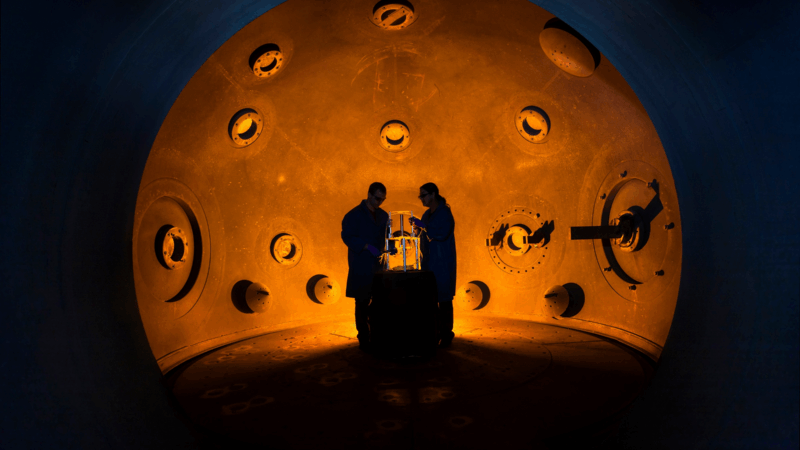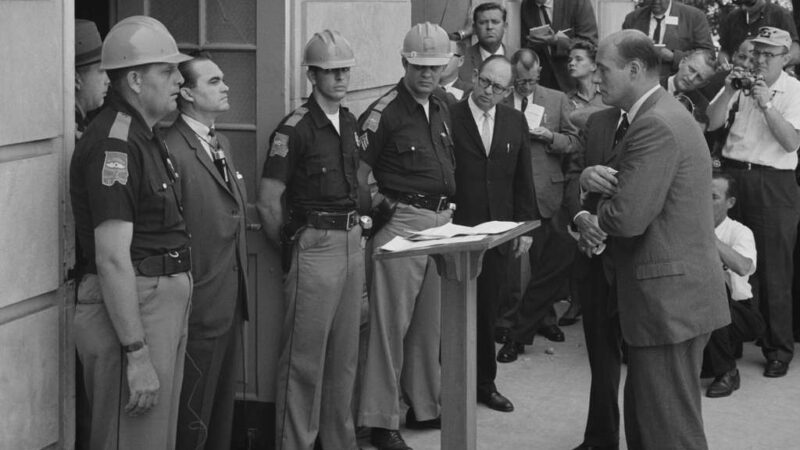DOGE employees gain accounts on classified networks holding nuclear secrets
Two members of Elon Musk’s Department of Government Efficiency have been given accounts on classified networks that hold highly guarded details about America’s nuclear weapons, two independent sources tell NPR.
Luke Farritor, a 23-year-old former SpaceX intern and Adam Ramada, a Miami-based venture capitalist, have had accounts on the computer systems for at least two weeks, according to the sources who also have access to the networks. Prior to their work at DOGE, neither Farritor nor Ramada appear to have had experience with either nuclear weapons or handling classified information.
A spokesperson for the Department of Energy flatly denied that Farritor and Ramada had access to the networks.
“This reporting is false. No DOGE personnel have accessed these NNSA systems. The two DOGE individuals in question worked within the agency for several days and departed DOE in February,” the spokesperson told NPR in an e-mailed statement.
The two sources contacted by NPR declined to be identified publicly because they were not authorized to speak about the matter to the press. They were able to directly see Ramada and Farritor’s names in the directories of the networks. The network directories are visible to thousands of employees involved in nuclear weapons work at facilities and laboratories throughout the U.S., but the networks themselves can only be accessed on specific terminals in secure rooms designated for the handling of classified information.
The DOGE employees’ presence on the network would not by itself be enough for them to gain access to that secret information, as data even within the networks is carefully controlled on a need-to-know basis, according to several experts reached by NPR.
In February, CNN reported that DOGE employees, including Farritor, were seeking access to the secretive computer systems. At the time, Energy Secretary Chris Wright flatly denied that they would be allowed on the networks.
“I’ve heard these rumors, ‘They’re like seeing our nuclear secrets.’ None of that is true at all; they don’t have security clearances,” Wright told CNBC.
Nuclear networks
The sources say that the networks in question are used by the National Nuclear Security Administration, the agency within the Department of Energy that oversees the nation’s vast nuclear stockpile, and the Department of Defense.
The first network, known as the NNSA Enterprise Secure Network, is used to transmit detailed “restricted data” about America’s nuclear weapons designs and the special nuclear materials used in the weapons, among other things. The network is used to transfer this extremely sensitive technical information between the NNSA, the nation’s nuclear weapons laboratories, and the production facilities that store, maintain and upgrade the nation’s nuclear arsenal.
The second network, known as the Secret Internet Protocol Router Network (SIPRNet), is used by the Department of Defense to communicate with the Department of Energy about nuclear weapons. SIPRNet is also used more broadly for sharing information classified at the secret level, information that “could potentially damage or harm national security if it were to get out,” explained a former career civil servant at the Department of Defense who requested anonymity to discuss classified systems.
Access to both networks would normally require a “Q” clearance, the highest level of security clearance at the Department of Energy. Obtaining a Q clearance is a lengthy process, but can be expedited in certain cases.
Although sources confirmed the presence of accounts, it remains unclear just how much access to classified data the two DOGE staffers actually have. Another source familiar with the matter, who spoke to NPR on condition of anonymity, due to sensitivities around the Department of Energy’s systems that hold classified information, said that the presence of DOGE officials on DOE’s classified systems would represent an escalation in DOGE’s recent privileges inside the agency, but those accounts would not give them carte blanche access to all files hosted on those systems.
They described the access as a “toehold” that would allow DOGE staffers to request information classified at the secret level. “They’re getting a little further in, it’s something to make note of,” they concluded. “It could lead to something bigger.”
DOGE employees might need access to classified information in order to discuss program details and future budget priorities, says Hans Kristensen, director of the Nuclear Information Project at the Federation of American Scientists, which tracks America’s nuclear program.
Although large portions of the nuclear weapons budget are ultimately unclassified, a lot of classified details likely go into setting those numbers. “I don’t think any of that would be open,” he says.
NNSA has already felt the effects of the Trump administration’s efforts to slash the government. In February, hundreds of workers were fired from the nuclear agency at the direction of DOGE. The decision was quickly reversed however, and ultimately fewer than 50 employees were dismissed, according to the agency.
News of the accounts comes amid growing concern about DOGE’s handling of data elsewhere in the government.
Earlier this month, NPR reported on a whistleblower at the National Labor Relations Board who had evidence that DOGE employees got high level access and may have copied and removed sensitive data from internal systems at their agency. The DOGE team asked that their activities not be logged on the system and then appeared to try and cover their tracks by turning off monitoring tools and deleting records of their access. Employees at the NLRB became concerned, particularly after detecting suspicious log-in attempts from an IP address in Russia using the newly created DOGE credentials.
It also comes during a controversy over Secretary of Defense Pete Hegseth’s use of the publicly available encrypted messaging app Signal to send sensitive details of a military strike on Houthi rebels in Yemen. Hegseth’s use of the app became public after the Editor-in-Chief of the Atlantic, Jeffrey Goldberg, was accidentally included on one chat. Last week, the New York Times reported about a second chat that included Hegseth’s wife, brother and personal lawyer.
NPR disclosure: Katherine Maher, the CEO of NPR, chairs the board of the Signal Foundation.
How George Wallace and Bull Connor set the stage for Alabama’s sky-high electric rates
After his notorious stand in the schoolhouse door, Wallace needed a new target. He found it in Alabama Power.
FIFA president defends World Cup ticket prices, saying demand is hitting records
The FIFA President addressed outrage over ticket prices for the World Cup by pointing to record demand and reiterating that most of the proceeds will help support soccer around the world.
From chess to a medical mystery: Great global reads from 2025 you may have missed
We published hundreds of stories on global health and development each year. Some are ... alas ... a bit underappreciated by readers. We've asked our staff for their favorite overlooked posts of 2025.
The U.S. offers Ukraine a 15-year security guarantee for now, Zelenskyy says
Ukrainian President Volodymyr Zelenskyy said Monday the United States is offering his country security guarantees for a period of 15 years as part of a proposed peace plan.
Genre fiction and female authors top U.S. libraries’ most-borrowed lists in 2025
All of the top 10 books borrowed through the public library app Libby were written by women. And Kristin Hannah's The Women was the top checkout in many library systems around the country.
The Best Tiny Desk Concerts of 2025
Which Tiny Desk made an audio engineer question everything? Which one made a producer want to cry? Touch grass? Look back on the year in Tiny Desk, with the people who make them.








